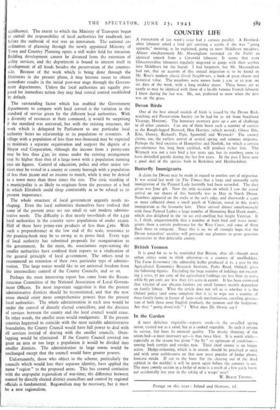COUNTRY LIFE
A PARAGRAPH of last week's issue had a curious parallel. A Hertford- shire labourer asked a land girl carrying a scythe if she was " going uppards," meaning, as he explained, going to mow Middlesex meadows. Almost simultaneously Mr. Massingham recorded (in the Field) an identical remark from a Cotswold labourer. It seems that even Gloucestershire labourers regularly migrated in gangs with their scythes into Middlesex for the haysel. I had forgotten, but Mr. Massingham had not, that an account of this annual migration is to be found in Mr. Rose's modern classic Good Neighbours, a book of great charm and historical value. The meadows were mown horn 3 a.m. to to p.m. on six days of the week, with a long midday pause. These hours are as nearly as may be identical with those of a locally famous French labourer I knew during the last war. He, too, preferred to mow when the dew was on the grass.
Devon Birds
One of the best annual records of birds is issued by the Devon Bird- watching and Preservation Society (to be had for 3s. 6d1 from Stockland Vicarage, Honiton). The honorary secretary puts up a sort of challenge to all other counties. Can any of them boast such a number of rantics as the Rough-legged Buzzard, Hen Harriers (which nested), Glossy Ibis, Kite, Osprey, Richard's Pipit, Spoonbill and Wryneck? The county claims, too, the earliest arrival of several spring and summer migrants. Perhaps the bird societies of Hampshire and Norfolk, for which a certain pre-eminence has long been credited, will produce richer lists. The Wryneck was not a rare bird a few years ago, but its number seem to have dwindled greatly during the last few years. In the past I have seen a good deal of the species both in Berkshire and Hertfordshire.
Butterfly Immigrants A claim for Devon may be made in regard to another sort of migration. It was stated last week (in The Times) that a large and unusually early immigration of the Painted Lady butterfly had been recorded. The date given was June 4th. Now the only occasion on which I saw the actual arrival on our shores of this butterfly was in May in North Devon. Numbers appeared on the rocks at the sea's edge, and afterwards a score or more collected about a small patch of Valerian, noted in this year's immigration as the favourite lure. There arrived almost simultaneously with these Painted Ladies a large number of Humming Bird Hawk moths, which also delighted in the (to us) evil-smelling but bright Valerian. It is, I think, unquestionable that a number of both bird and insect immi- grants show a certain preference for the West Coast, and some of them flock there to emigrate. Since this is so, we all strongly hope that the Devon naturalists' societies will persuade our planners to grant generous sanctuaries in that delectable county.
British Yeomen It is good for us to be reminded that Britain, after all—though most urban critics seem to think otherwise—is a country of smallholders. The Farm Economist (the admirable leaflet produced at is. a year by the Agricultural Economics Research Institute, Parks Road, Oxford) gives the following figures. Excluding the large number of holdings not exceed- ing 5 acres, 57 per cent. of the agricultural loldings are less than 5o acres, while 85 per cent. are less than 15o acres in extent. It has been estimated that 150,000 of our 280,000 farmers are small farmers mainly dependant on family labour. What the article does not tell us is whether it is the Oxford policy (and some complain that it is) to wipe out a number of these family farms in favour of large-scale mechanisation, entailing destruc- tion of both those most English products, the yeoman and the hedgerow. Are they " going down'ards " ? What does Dr. Orwin say ?
In the Garden A most delicious vegetable—experto crede—is the so-called spring onion, treated not as a salad, but as a cooked vegetable. As such it retains its savour, but loses its unsocial quality. The drastic thinning of the onion-bed—a most necessary act—is thus twice blest. It is worth while— especially as the season has given " the fly " its optimum of conditions— sowing both turnips and swedes now. Their chief enemy is no longer active. Hedge-trimming, which is in season, should be practised at once and with utter ruthlessness on that now most popular of hedge plants, lonicera nitida. If cut to the bone (for the clearing out of the dead rubbish in the middle) it will be green again before the summer is out. The most comely section in a hedge of mine is a reach of a few yards burnt out accidentally last year in the taking of a wasps' nest!
W. BEACH THOMAS.
Postage on flu, issue : Inland and Overseas, id.






























 Previous page
Previous page